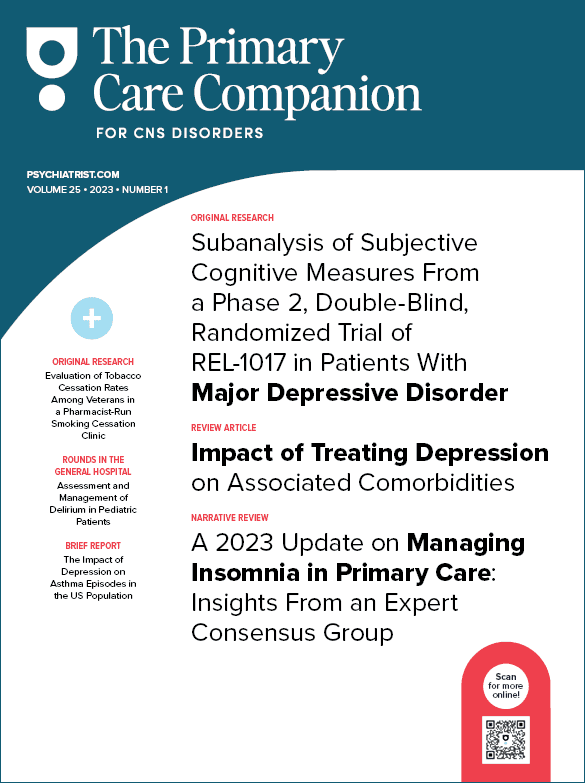The geriatric population in India suffers from a variety of problems associated with old age, which are increasingly drawing attention of policy planners, social scientists, and medical and mental health professionals in the country. The global elderly population will increase in the next decade from 1 billion in 2020 to 1.4 billion in 2030 and to 2.1 billion in the next 3 decades.1 Globally, 1 of every 6 people will be aged ≥ 60 years, and two-thirds of the elderly population will be from developing countries such as India.1 According to the National Council on Aging, about 92% of the elderly population have at least 1 chronic noncommunicable disease, and 77% have at least 2.2 Cardiovascular diseases, stroke, carcinomas, and diabetes mellitus are among the most common chronic health conditions, causing two-thirds of elderly deaths each year.2–5 Research has shown the advanced compassionate care framework to be a vehicle for improving elderly care in tertiary health care institutions.6 Advanced compassionate care is the agreed-upon vision for excellence in tertiary care institutions.6,7
The most common cognitive health issue facing the elderly is dementia. Globally, 47.5 million people have dementia, and this number is predicted to nearly triple by 2050. Chronic health conditions and substance abuse, such as diabetes, hypertension, depression, HIV, and smoking, increase the risk of developing dementia.2 Physical and mental health problems among the elderly in India are important issues that should not be ignored. In a recent Indian geriatric population study,3 18.9% of elderly individuals were having depressive symptoms, and 22.6% were having anxiety symptoms. Similar higher rates were reported in international studies conducted in Hong Kong and the United Kingdom.4 Regular screening camps and health awareness meetings with the elderly and their caregivers designed to provide solutions for their day-to-day problems are part of an important large-scale strategy to tackle this issue in India.3
With all of this in mind, an initiative was undertaken by the director of All India Institute of Medical Sciences, Bathinda, a national tertiary care institution in northwest India, to conduct a brainstorming session and panel discussion to address the common health issues faced by the elderly. A multidisciplinary team comprised of various consultants from different specialties was established to conduct this event. The theme was “Advanced Medicine Compassionate Care.”
The speaker of the keynote address presented the latest data on common health problems faced by the elderly. Afterward, the attendees, comprised of more than 100 elderly residents of Bathinda, interacted with the director and panelists. The panelists spoke about the common presenting complaints among elderly patients attending their outpatient departments and shared their experiences of managing medical, surgical, and psychiatric conditions in the geriatric age group. The participants were encouraged to ask questions, and all queries were satisfactorily answered by the faculty/panelists. Better communication skills, shared decision-making, and goal setting can support the provision of compassionate care and excellence in any health care institution.6,7 Various themes of geriatric health care like home-based medical care, online consultation, setting up a separate geriatric medicine department, provision of elderly support group facilities, and reducing the outpatient department waiting time for the elderly were discussed. All participants agreed on the need for advanced medicine and compassionate care for the geriatric population in India. Advanced medicine and compassionate care will be a game changer for geriatric mental health and patient care services in India in the 21st century.
Article Information
Published Online: June 13, 2023. https://doi.org/10.4088/PCC.22br03389
© 2023 Physicians Postgraduate Press, Inc.
Prim Care Companion CNS Disord. 2023;25(3):22br03389
Submitted: August 5, 2022; accepted October 21, 2022.
To Cite: Pathak A, Singh GP, Verma N. Advanced compassionate care for the geriatric population in India. Prim Care Companion CNS Disord. 2023;25(3):22br03389.
Author Affiliations: Department of Forensic Medicine, All India Institute of Medical Sciences (AIIMS), Bathinda, Punjab, India (Pathak); Department of Psychiatry, AIIMS, Bathinda, Punjab, India (Singh); Department of General Medicine, AIIMS, Bathinda, Punjab, India (Verma).
Corresponding Author: Gurvinder Pal Singh, MD, Department of Psychiatry, AIIMS, Bathinda, Punjab ([email protected]).
Relevant Financial Relationships: None.
Funding/Support: None.
Acknowledgments: The authors thank the senior administrative authorities (D. K. Singh, MD; Satish Gupta, MDS; and Rattan Singh, MD, all from AIIMS, Bathinda, India) for their constructive guidance, suggestions, and assistance as well as other panelists (Bhupinder Singh, DM [cardiology]; Tarun Goyal, MS [orthopedics]; Shivani Sidana, DM [endocrinology]; and K. S. Kaura, MCh [urology], all from AIIMS, Bathinda, India) for providing academic information and the opportunity to work on this project. None of the acknowledged individuals report conflicts of interest related to this report.
References (7)

- Rudnicka E, Napierała P, Podfigurna A, et al. The World Health Organization (WHO) approach to healthy ageing. Maturitas. 2020;139:6–11. PubMed CrossRef
- World Health Organization. Fact sheet. WHO website. Accessed on August 1, 2022. https://www.who.int/news-room/fact-sheets/detail/dementia
- Kumar V, Klanidhi KBK, Chakrawarty A, et al. Assessment of mental health issues among geriatric population during COVID19 pandemic, Indian perspective. Asian J Psychiatr. 2021;66:102897. PubMed CrossRef
- Robb CE, de Jager CA, Ahmadi-Abhari S, et al. Associations of social isolation with anxiety and depression during the early COVID19 pandemic: a survey of older adults in London, UK. Front Psychiatry. 2020;11:591120. PubMed CrossRef
- Wong SYS, Zhang D, Sit RWS, et al. Impact of COVID-19 on loneliness, mental health, and health service utilization: a prospective cohort study of older adults with multimorbidity in primary care. Br J Gen Pract. 2020;70(700):e817–e824. PubMed CrossRef
- Lown BA. Compassion is a necessity and an individual and collective responsibility; comment on “why and how compassion necessary to provide good quality healthcare?” Int J Health Policy Manag. 2015;4(9):613–614. PubMed CrossRef
- Pfaff K, Markaki A. Compassionate collaborative care: an integrative review of quality indicators in end-of-life care. BMC Palliat Care. 2017;16(1):65. PubMed CrossRef
Enjoy free PDF downloads as part of your membership!
Save
Cite
Advertisement
GAM ID: sidebar-top




